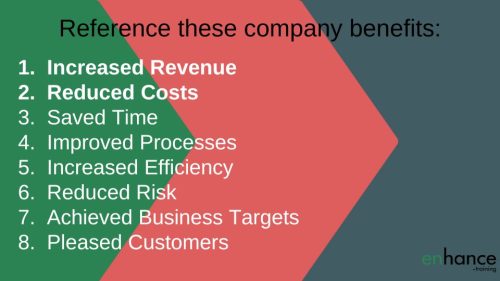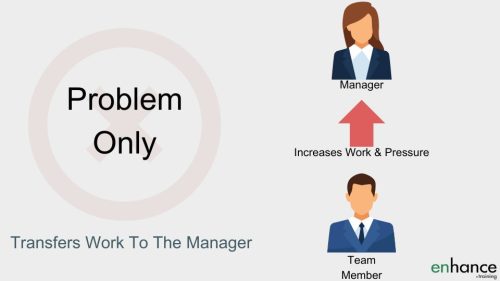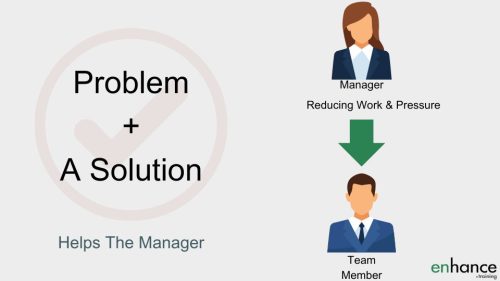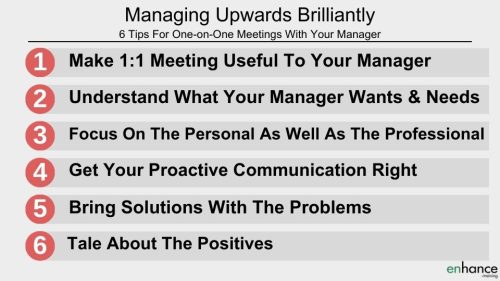Managing Upwards Brilliantly – 6 Tips for One-on-One Meetings With Your Manager

Managing upwards well is so important. Having a good relationship with your boss improves your happiness at work, your engagement, increases what you learn and speeds up your career progress. Who doesn’t want all these outcomes?
The one-on-one meeting with your manager is likely to be your most important meeting whether you have it each week or once a month. One-on-one meetings with your manager are formal time in which you can build relationships and trust, create good communication channels and share information, solve problems and make decisions. One-on-one meetings with your boss are also vital to increasing the mentoring and coaching you get from you manager.
To help you improve your managing upwards and what you get from one-on-one meetings with your manager I am sharing 6 tips that helped me massively in building good relationships with lots of my managers.
After we have discussed these six tips, I share 7 suggestions of what to include in your one-on-one meetings with your manager towards the end of this article.
Managing Upwards Brilliantly – 6 Tips for One-on-One Meetings With Your Manager
- Make your one-on-one meetings with your manager useful to them
- Understand what your manager wants and needs
- Focus on the personal as well as the professional
- Get Your Proactive Communication Right
- Bring solutions with the problems
- Talk About the Positives
Watch on YouTube
Listen on Podcast
Persuading your manager to have one-on-one meetings with you is the first challenge. Many managers see them as a chore rather than a super useful session to them personally. Let’s focus on how you
1. Make your one-on-one meetings with your manager useful to them
For your manager to continue having one-on-one meetings with you, they must feel the meetings are useful to them and help meet their goals.
The more senior staff members get, the more demands on their time. Your manager will be busy with plenty of pressure on them to perform and deliver. When thinking about what to cover in one-on-one meetings with your manager, always position the meetings as how having one-on-one meetings will help them.
Sharing information and updates is a key part of one-on-one meetings. The key is not to share everything, but to update on what is important to the manager and the team and do this in a concise way.
For example, rather than giving a blow by blow account of all the activities and challenges you have faced in the last week on an important project, you might simply state that everything is on schedule and next week you will need some help overcoming an anticipated bottleneck – – assuming these are the key bits of information to convey.
Remind your boss of the benefits to the team and them personally of the work that you do. Talk to how you are impacting any of these eight key areas that all bosses and companies need:
- Increased Revenue
- Saved Costs
- Saved Time
- Improved Processes
- Increased Efficiency,
- Reduced risk
- Achieved business targets
- Pleased customers
Link how your work is helping the team hit their goals, which typically are also the manager’s goals. The more you show your manager you are helping them hit their personal goals, the more your manager will like you and help you achieve your goals.

2. Understand what your manager wants and needs is the next tip to manage upwards brilliantly
It is super hard to wow your manager if you don’t know what they care about. Once you understand their personal goals, pressures and priorities, creating a wow factor is a lot lot easier.
Ask questions to find out what your manager is working on and find out why it is important to them. The goals the manager has personally are likely to be closely linked to team priorities. Example questions might include:
- Can you share the team priorities or key goals for the next 3 months so that I can make sure I am supporting the team reaching those goals?
- Are you able to share the key priorities that you would like me to work on, so I know I am working on the most important areas to help the team reach their goals?
- What are the key projects you are working on and how can I support you in delivering them?
Once you understand what your manager wants and needs, you can start anticipating what would be useful for you to deliver to help them achieve their goals. Use your one-on-one meetings with your manager to proactively check what you are planning – help your boss by running your ideas past them.
When in your one-on-one meetings with your manager and more generally, try to use the language your bouses. Use the phrases they say, the abbreviations and mirror their talking style. You are likely to do being some of this already – it is part of the communication skills we all learn. Being more conscious of it and making more effort to align without becoming unnatural will help build rapport and connection with your boss.
Work at managing your boss’ expectations. Be as flexible as you can and do your best to deliver against your boss’ expectations.
An essential part of managing upwards brilliantly is to do a good job and deliver what your boss wants and needs.

3. Focus on the personal as well as the professional in your one-on-one meetings with your manager
Many professionals and managers focus too much on the professional side of the relationship with their bosses and don’t do enough to build the personal side.
Having a personal connection and at least appreciating your manager, preferably liking them as a person, is really important. If you like your boss, then your boss is much more likely to like you in return.
Find areas of common interest with your boss and ask them questions. Get them talking about what they like doing. Also share some of your life outside work with your boss. Example questions might include:
- What do you like doing outside of work?
- Do you play any sports? Do you like watching sports? What level do you play at?
- Do you have a family? What age are your kids? What do your kids like doing after school?
- What music do you listen to? What concerts would you recommend that you have been to recently?
Do a bit of homework – on social media and asking your colleagues – and you can create a list of relevant and interesting questions fairly quickly.
Build a personal relationship with your boss, alongside a professional one.
4. Get Your Proactive Communication Right is the next tip to manage upwards brilliantly
Most managers love team members proactively keeping them informed about the key actions, activities and results being delivered. I certainly do – it is one less thing that I need to keep on top of plus being proactively communicated to in an open way gives me a lot of confidence in the team member.
Make the time to understand what your manager cares about, work out what you are going to communicate and then proactively communicate it in a way that your manager appreciates.
Your boss is time poor, so be concise and get to the key points quickly sharing the minimal background or context needed. Your boss will ask for more detail in the areas they want to understand. Give them the headlines.
Work out through trial and error or by discussing with your boss how they like to be communicated with. Is in an email each day, or week. Or a one-on-one meeting each week plus ad hoc meetings as needed – which for instance was my personal preference. Find out how your boss likes to be communicated to and adjust your preferences to fit theirs.
Don’t leave it more than a week to have some form of communication with your boss. Ideally, you will be in proactive contact most days.

5. Bring solutions with the problems in your one-on-one meetings with your manager
When you discuss solutions with the problems you bring up in your one-on-one meetings with your manager, you are effectively trying to take work away from your manager while leaving them the opportunity to input and make the final decisions.
If you only bring the problem, you are effectively adding more work to your manager which is never a good thing. Without a solution, you are saying “I have found a problem – it is your job to solve it and tell me what to do”. Would you like a team member to create extra work for you in this way?
Always make the effort to think of a viable solution when you spot a problem. Help your manager and take ownership. This is a brilliant way of managing upwards that will earn you a lot of brownie points.
In your one-on-one meetings with your manager, make a bit of time to go through the problems you are encountering or issues you have spotted and ask your manager to input into your suggested solution. When you have an agreed solution, ask your manager if you can implement it or organise for it to be implemented.
When you are able to implement these solutions largely on your own, you make yourself a very valuable team member to your manager.
6. Talk About the Positives in your one-on-one meetings with your manager
Everyone likes getting useful and positive feedback. The further you progress your career, the harder it is to get any feedback. Your boss will want to get feedback.
Start with sharing positive feedback. It could be simple – an example might be:
“I really liked how you explained the team goals in our team meeting. Your explanation was really clear, memorable, and made a lot of sense. Thank you”
Give positive praise when you feel they deserve it. Being selective will avoid your manager thinking you are trying to suck up to them.
The more you and other team members compliment what you like your manager doing, the more they will do of that. You can influence behaviour without needing to be negative.
Try to avoid giving negative feedback until you have a strong and established relationship. Make sure your negative feedback is specific and useful AND that you give positive feedback at least three times more than negative feedback to keep your manager happy.
Positive reinforcement is a great technique to develop and practice with honesty.
Here are ideas of topics to discuss in your one-on-one meetings with your manager
I have found the best use of one-on-one meetings with your manager are to:
- Build professional and personal relationships with your manager
- Share information about what you are working on and what ideas, plans and solutions you would like to implement
- Get or clarify direction. I usually propose the direction I think I should be going in and explain why, then allow my boss to input.
- Solve problems – the one-on-one meeting with your manager is a great opportunity to work together to solve problems. Bring a solution of your own and work with your manager to refine it.
- Suggest decisions or help your manager make decisions so your work and projects can move forward quickly
- Receive mentoring and coaching. As a minimum ask questions of your manager. For instance – if you where in x situation, what would you do? Get them helping you improve.
- Ask for feedback from your manager about what you are doing well and what steps you can take to improve in your stronger and weaker areas. Give feedback to your manager when you feel comfortable doing so.
You don’t have to cover each of these areas in every one-on-one meeting with your manager. More likely, you will spend a lot of time on one or two areas in each meeting. Do your best over time to get a good balance across all the areas.
In Summary
There is loads you can and should be doing to ensure you are managing upward brilliantly. Your relationship with your boss is the most important one you have at work for your personal happiness and career progress. Be proactive and try to make it easy for your boss to manage you.
Ideally, you will also be an above average performer compared to your peers. With a little extra work and by implementing some of the ideas we have gone through, you absolutely should be able to achieve this. Perception is reality for many managers and making your boss’ life easy goes a long way to building great relationships.
As a reminder, we have gone through:
- Make your one-on-one meetings with your manager useful to them
- Understand what your manager wants and needs
- Focus on the personal as well as the professional
- Get Your Proactive Communication Right
- Bring solutions with the problems
- Talk About the Positives

So much depends on the relationship you have with your manager. Learning how to manage upwards brilliantly is so important for you personally. Working to keep your manager happy is worth every minute invested.
Use these tips to improve the relationship you have with your manager. Be proactive. Take the lead in managing the relationship and you will be a lot better off.







